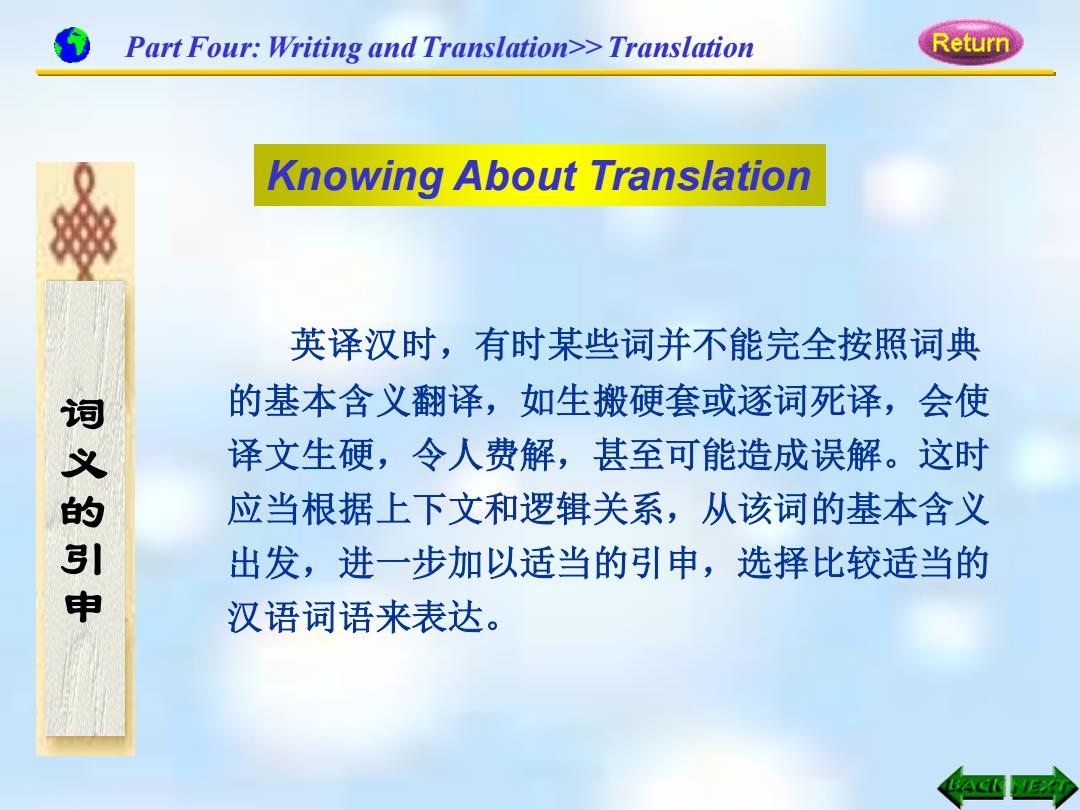
Part Four:Writing and Translation>>Translation Return Knowing About Translation 英译汉时,有时某些词并不能完全按照词典 的基本含义翻译,如生搬硬套或逐词死译,会使 词义的引申 译文生硬,令人费解,甚至可能造成误解。这时 应当根据上下文和逻辑关系,从该词的基本含义 出发,进一步加以适当的引申,选择比较适当的 汉语词语来表达
英译汉时,有时某些词并不能完全按照词典 的基本含义翻译,如生搬硬套或逐词死译,会使 译文生硬,令人费解,甚至可能造成误解。这时 应当根据上下文和逻辑关系,从该词的基本含义 出发,进一步加以适当的引申,选择比较适当的 汉语词语来表达。 词 义 的 引 申 Part Four: Writing and Translation>> Translation Knowing About Translation
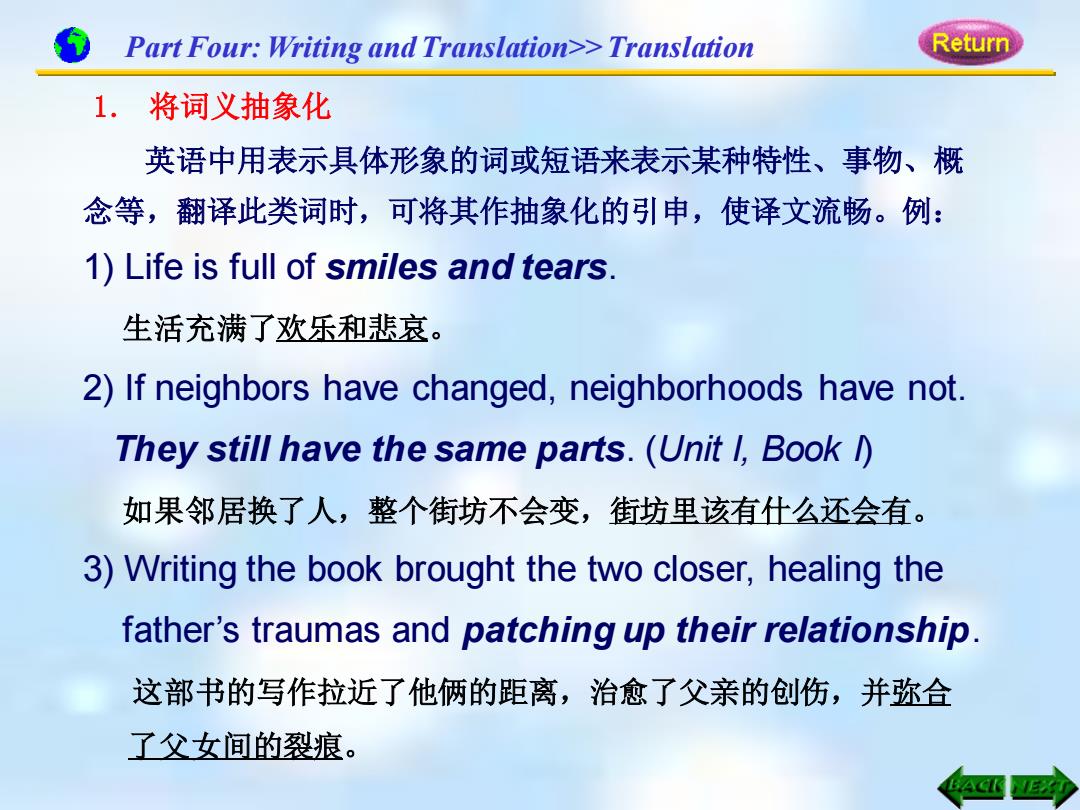
Part Four:Writing and Translation>>Translation Return 1.将词义抽象化 英语中用表示具体形象的词或短语来表示某种特性、事物、概 念等,翻译此类词时,可将其作抽象化的引申,使译文流畅。例: 1)Life is full of smiles and tears. 生活充满了欢乐和悲哀。 2)If neighbors have changed,neighborhoods have not. They still have the same parts.(Unit I,Book 如果邻居换了人,整个街坊不会变,街坊里该有什么还会有。 3)Writing the book brought the two closer,healing the father's traumas and patching up their relationship. 这部书的写作拉近了他俩的距离,治愈了父亲的创伤,并弥合 了父女间的裂痕
1. 将词义抽象化 英语中用表示具体形象的词或短语来表示某种特性、事物、概 念等,翻译此类词时,可将其作抽象化的引申,使译文流畅。例: 1) Life is full of smiles and tears. 生活充满了欢乐和悲哀。 2) If neighbors have changed, neighborhoods have not. They still have the same parts. (Unit I, Book I) 如果邻居换了人,整个街坊不会变,街坊里该有什么还会有。 3) Writing the book brought the two closer, healing the father’s traumas and patching up their relationship. 这部书的写作拉近了他俩的距离,治愈了父亲的创伤,并弥合 了父女间的裂痕。 Part Four: Writing and Translation>> Translation
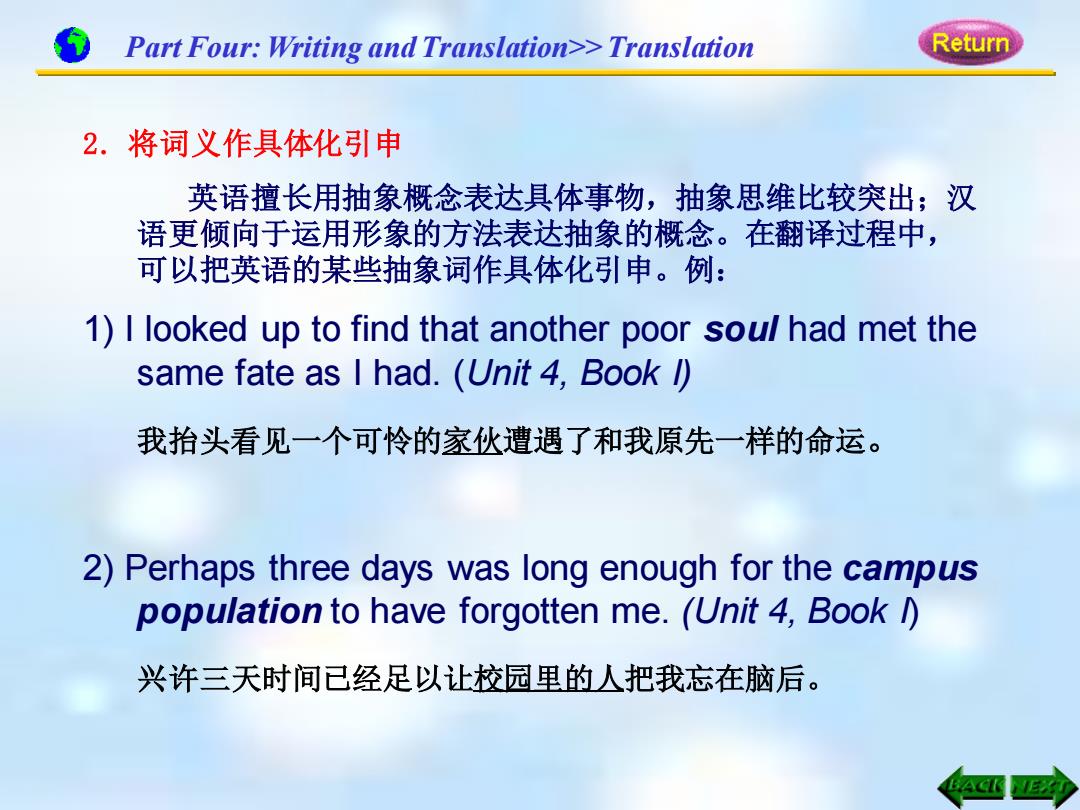
Part Four:Writing and Translation>>Translation Return 2.将词义作具体化引申 英语擅长用抽象概念表达具体事物,抽象思维比较突出;汉 语更倾向于运用形象的方法表达抽象的概念。在翻译过程中, 可以把英语的某些抽象词作具体化引申。例: 1)I looked up to find that another poor sou/had met the same fate as I had.(Unit 4,Book / 我抬头看见一个可怜的家伙遭遇了和我原先一样的命运。 2)Perhaps three days was long enough for the campus population to have forgotten me.(Unit 4,Book 兴许三天时间已经足以让校园里的人把我忘在脑后
2. 将词义作具体化引申 英语擅长用抽象概念表达具体事物,抽象思维比较突出;汉 语更倾向于运用形象的方法表达抽象的概念。在翻译过程中, 可以把英语的某些抽象词作具体化引申。例: 1) I looked up to find that another poor soul had met the same fate as I had. (Unit 4, Book I) 我抬头看见一个可怜的家伙遭遇了和我原先一样的命运。 2) Perhaps three days was long enough for the campus population to have forgotten me. (Unit 4, Book I) 兴许三天时间已经足以让校园里的人把我忘在脑后。 Part Four: Writing and Translation>> Translation
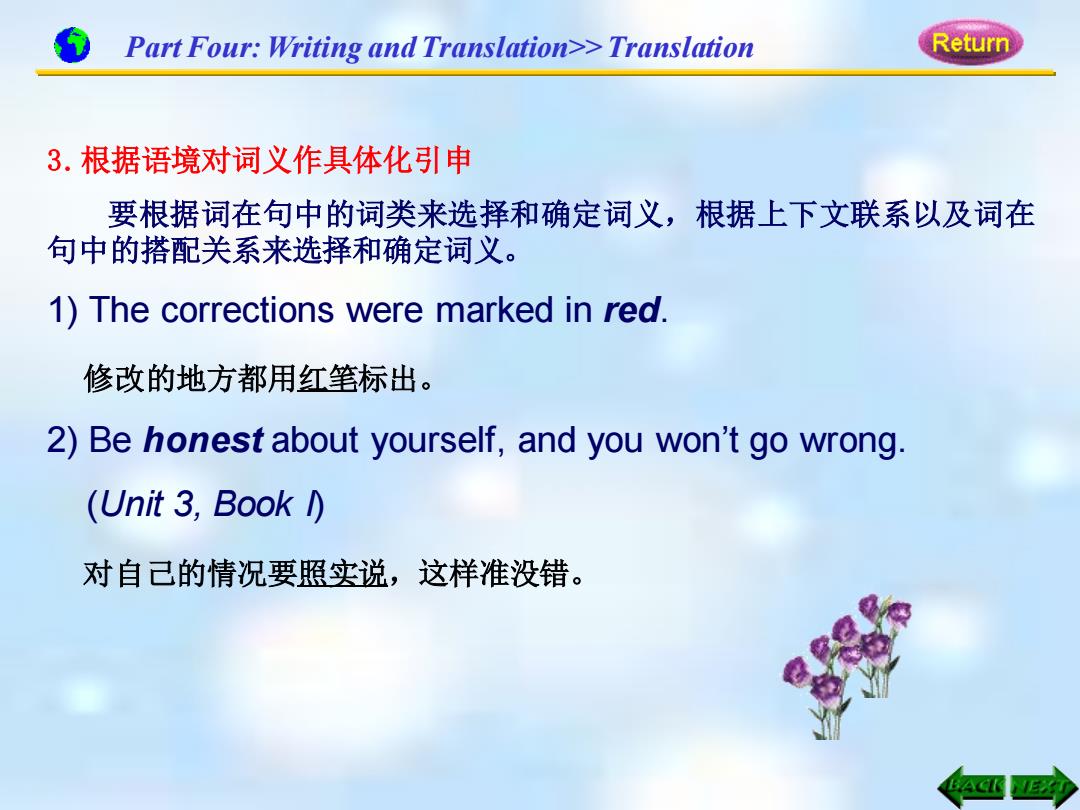
Part Four:Writing and Translation>>Translation Return 3.根据语境对词义作具体化引申 要根据词在句中的词类来选择和确定词义,根据上下文联系以及词在 句中的搭配关系来选择和确定词义。 1)The corrections were marked in red. 修改的地方都用红笔标出。 2)Be honest about yourself,and you won't go wrong. (Unit 3,Book 对自己的情况要照实说,这样准没错
3.根据语境对词义作具体化引申 要根据词在句中的词类来选择和确定词义,根据上下文联系以及词在 句中的搭配关系来选择和确定词义。 1) The corrections were marked in red. 修改的地方都用红笔标出。 2) Be honest about yourself, and you won’t go wrong. (Unit 3, Book I) 对自己的情况要照实说,这样准没错。 Part Four: Writing and Translation>> Translation
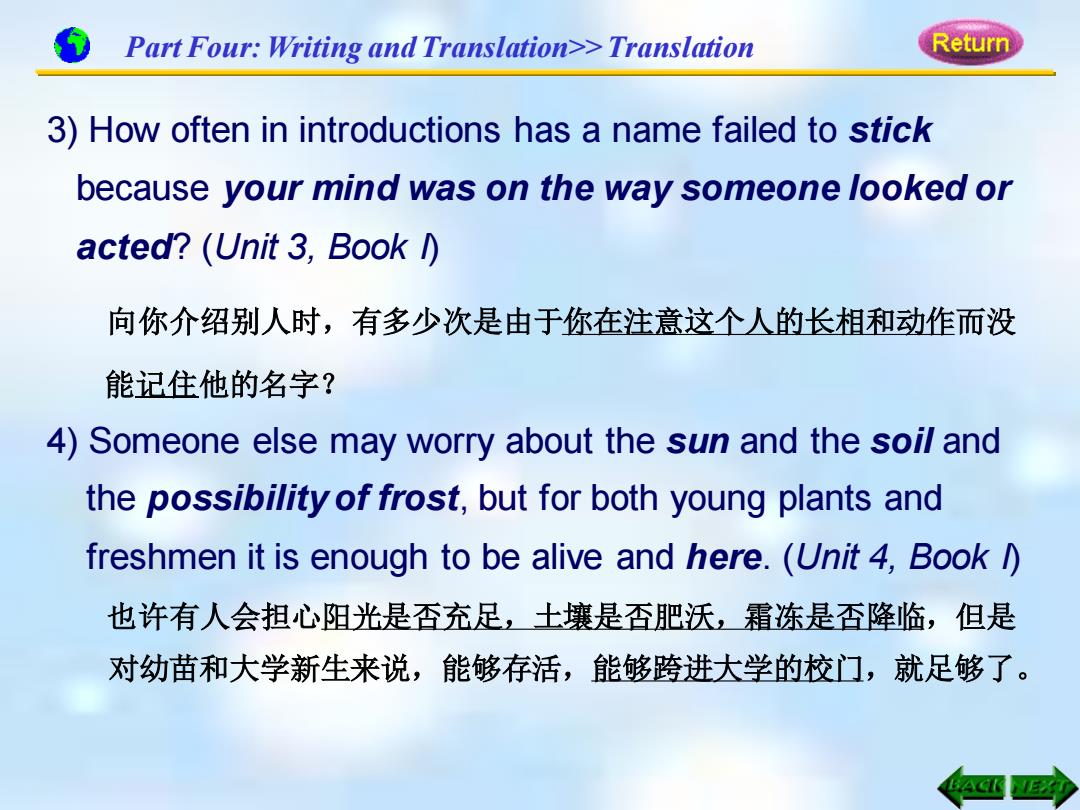
Part Four:Writing and Translation>>Translation Return 3)How often in introductions has a name failed to stick because your mind was on the way someone looked or acted?(Unit 3,Book 向你介绍别人时,有多少次是由于你在注意这个人的长相和动作而没 能记住他的名字? 4)Someone else may worry about the sun and the soil and the possibility of frost,but for both young plants and freshmen it is enough to be alive and here.(Unit 4,Book / 也许有人会担心阻光是否充足,土壤是否肥沃,霜冻是否降临,但是 对幼苗和大学新生来说,能够存活,能够跨进大学的校门,就足够了
3) How often in introductions has a name failed to stick because your mind was on the way someone looked or acted? (Unit 3, Book I) 向你介绍别人时,有多少次是由于你在注意这个人的长相和动作而没 能记住他的名字? 4) Someone else may worry about the sun and the soil and the possibility of frost, but for both young plants and freshmen it is enough to be alive and here. (Unit 4, Book I) 也许有人会担心阳光是否充足,土壤是否肥沃,霜冻是否降临,但是 对幼苗和大学新生来说,能够存活,能够跨进大学的校门,就足够了。 Part Four: Writing and Translation>> Translation